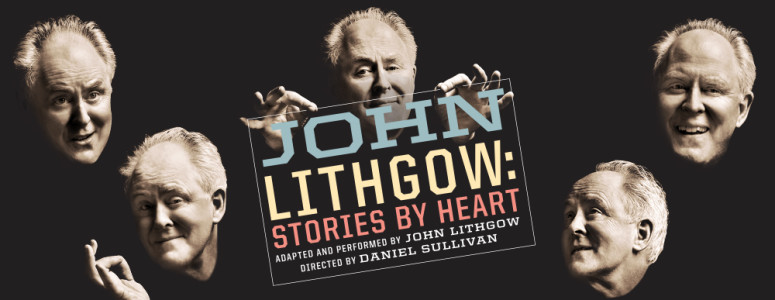Alas, John Lithgow has taken a bit of a beating with his one-man STORIES BY HEART at the American Theatre.
(I insist on abridging the playhouse’s corporate name.)
The reviews that I’ve read of this Roundabout-sponsored production have not been enthusiastic. So I feel bad about the practice known in the National Football League as “piling on.” There it warrants a penalty. Perhaps I’ll deserve one too after I write this.
However, none of the reviews I’ve seen has taken issue with a certain aspect of the production that greatly troubled me. Granted, my biggest objection may be one found in plenty of reviews that I missed.
But just in case no one has, for the record: HAIRCUT, the first story that Lithgow relates, is a most problematic piece.
Mind you, the concept that author Ring Lardner devised is an excellent one: as soon as a small-town barber gets a customer in his chair, he talks non-stop from the first snip of hair to the final act of pulling off the sheet and sending him on his way.
What he says, however, is not what a 21st century audience wants to hear – at least not the one surrounding me.
Lithgow chuckles his way through a story about a “great trick” that traveling salesman Jim Kendall used to play. He’d see a store with the owner’s name on it, and when he got to the next town, he’d send a postcard to the owner at his store, one that implied that the man’s wife was having an affair.
Can you imagine? Lord only knows how much unnecessary chaos from arguments to murder that Kendall caused. But the barber admires Kendall’s ability as “a jokesmith” and thinks the ruse hilarious. Doesn’t he ever stop to think of the ramifications?
Equally funny to the barber is his story about a townie who purposely makes a developmentally disabled boy the butt of his jokes. “He’d send him to a garage for a left-handed monkey wrench,” says the barber before bursting out a laugh, for of course wrenches aren’t divided into left or right.
This style of humor went out by the ‘70s – and not a moment too soon. Baby Boomers used to roar with laughter when seeing “Crazy Guggenheim” on Jackie Gleason’s show yuk it up after coming to one lame perception after another. Now, thank heavens, our collective consciousness has been raised to the point where we sympathize rather than laugh at those less fortunate than we.
Worse was to come when the barber told of another Jim Kendall dido. The man became love-struck with a local lass who wanted nothing to do with him, mostly because Jim was married. So what did Jim do? Says the barber with considerable admiration, “Went right up to her house one evenin’ and when she opened the door, he forced his way in and grabbed her.”
The audience that hadn’t been laughing much at the previous tales now turned stunningly and frostily silent. With all that’s been happening in the news, Lithgow should have definitely scrapped this repugnant story.
Even without these examples of sheer bad taste, HAIRCUT fails because it simplistically suggests that a person living in a small town has a small and unfeeling mind. To be sure, such people exist, but we see them in large cities, too. Some, of course, have far more influential jobs.
Lardner and Lithgow seem to enjoy practical jokes to the point where the first of April each year must be their high holy day – the one 24-hour span of the year when people can trot out their worst instincts and get away with annoying or scaring people.
Sentimentality may well be somewhat responsible for his choosing the tale. Lithgow establishes that he heard this story during his childhood thanks to his father’s reading it to him at many a bedtime. But Lithgow has been a full-fledged adult for more than half a century. In that time, he surely should have seen the story’s blatant offenses.
Could part of his motivation have been that he liked the challenge of miming the moves a barber makes all in a day’s work? For Lithgow does his tonsorial chores extraordinarily well, clipping here with no scissors, brushing there with no brush, moving from one side to another as if he’s been doing it all his life.
In all fairness, Lithgow’s second act doesn’t ever offend. He starts telling us a great deal about his father, a journeyman regional theater director. To my surprise, he didn’t tell the poignant story of his father’s being fired as artistic director of the McCarter Theatre in Princeton around the same time his son won his first Tony for THE CHANGING ROOM.
Many would have welcomed that one, for plenty of theatergoers to whom I’ve spoken have told me they’re disappointed that Lithgow is simply telling two fictional stories instead of telling them about his Life in the Theatre.
Nevertheless, he almost saves the evening with UNCLE FRED FLITS BY, P.G. Wodehouse’s tale of an incorrigible relative whom you love to hate. Lithgow came out with plenty of marvelous expressions, adopted a funny walk and somehow became a Hirschfeld come to life. The peals of audience laughter were much earned.
And yet, all this enthusiasm from the crowd should have reiterated to Lithgow that he needed an inoffensive story for his first act. With all the awareness in the last few decades of minority rights, why did Lithgow not anticipate that his audience would resist HAIRCUT? Where has he been all this time – on the eighth rock from the sun?




